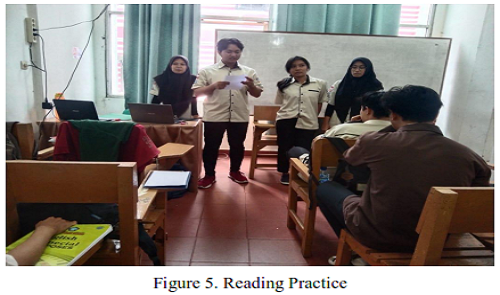
The Implementation Of Scientific Approach Based On English Learning Strategy (SABELS) To The Students’ Ability In Reading Comprehension
Abstract
Keywords
Full Text:
PDFReferences
Allington, R. L., & Strange, M. (1980). Learning Through Reading in The Content Areas. DC Heath & Company.
Ary, D., Jacobs, L. C., Sorenson, C., & Walker, D. A. (2010). Introduction to Research in Education: Wadsworth. Cengage Learning.
Edwina, M. P. (n.d.). The Implementation Of Sabels In Teaching Reading Comprehension.
Heilman, W. A. (1981). Principles and Practices Reading. Washington: A Bell and Howell Company.
Kebudayaan, K. P. (2013). Materi Pelatihan Guru Implementasi Kurikulum 2013. Nuh, M.(2013). Kurikulum.
Klingner, J. K., Vaughn, S., & Boardman, A. (2015). Teaching Reading Comprehension to Students with Learning Difficulties. Guilford Publications.
Kurniasih, I., & Sani, B. (2014). Implementasi Kurikulum 2013: Konsep & Penerapan. Kata Pena.
Manalu, D. B., & Napitupulu, S. (n.d.). Scientific Approach-Based English Learning Strategy in Online Learning: Learners’ Satisfaction and Obstacles. PAROLE: Journal of Linguistics and Education, 12(1), 81–90.
Miles, M. B., & Huberman, A. M. (1994). Qualitative Data Analysis: An expanded sourcebook. sage.
Muhammad, M., & Nurdyansyah, N. (2015). Pendekatan Pembelajaran Saintifik. Nizamia Learning Center.
Napitupulu, S., Manalu, D. B., & Siahaan, S. (2019). Scientific Approach-Based English Learning Strategy (SABELS). The New Educational Review, 56, 41–52.
Napitupulu, S., Siahaan, S., & Manalu, D. B. (2018). SABELS (Scientific Approach Based English Learning Strategy).
Nunan, D. (1999). Second Language Teaching & Learning. ERIC.
Oakhill, J., Cain, K., & Elbro, C. (2019). Reading Comprehension and Reading Comprehension Difficulties. Reading Development and Difficulties: Bridging the Gap between Research and Practice, 83–115.
Parnawi, A. (2020). Penelitian Tindakan Kelas (Classroom Action Research). Deepublish.
Sitio, I. T. (2020). The Effect Of Scientific Approach-Based English Learning Strategy (Sabels) On The Students’reading Comprehension Ability At Grade Ten Of Sma Negeri 4 Pematangsiantar. Nommensen Journal Of English Studies, 1(1), 12–24.
Smith, R., Snow, P., Serry, T., & Hammond, L. (2021). The Role of Background Knowledge in Reading Comprehension: A Critical Review. Reading Psychology, 42(3), 214–240.
Sundayana, W. (2015). Readiness and Competence of Senior High School English Teachers to Implement Curriculum 2013. Indonesian Journal of Applied Linguistics, 5(1), 29–36.
DOI: http://dx.doi.org/10.31258/jes.7.3.p.518-529
Refbacks
- There are currently no refbacks.
Copyright (c) 2023 Ika Purnama Sari

This work is licensed under a Creative Commons Attribution 4.0 International License.
Publisher: FKIP Universitas Riau













